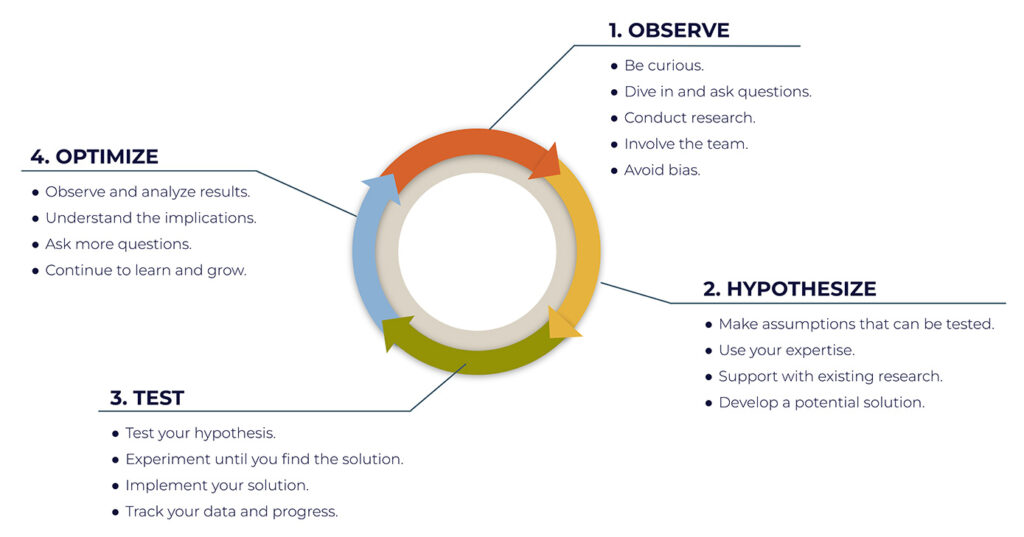
Card Games and Process
Growing up in the Midwest, card games with my family were a regular pastime when everyone got together for the holidays. Sometimes we just played cards after dinner on a Tuesday night. Regardless of when we played, we always played the same game: euchre.
Euchre is a game filled with fast-paced decisions, a pinch of luck, and a lot of superstition. Dealing cards is a major occasion, and if you do it incorrectly, anyone in my family will call you out to redeal — myself included. If you really want to discuss the nuances of the game, let’s schedule some time together. I’d happily talk your ear off with the details.
One doesn’t pay as much attention to the strategy and process involved with winning (or losing, in my case) when you grow up playing the game. The way you play starts to feel like second nature or muscle memory, and not a ton of thought goes into the cards you lay down — often because of how fast-paced the game can be.
That “muscle-memory-feeling” came to an abrupt halt when my uncle began redealing cards from three rounds ago and pointed out everything I did wrong! “This is a learning opportunity,” he said. “Let’s look at what you should have done instead.”
My uncle would then walk me through his process of observing the actions of the players at the table, analyzing how they may play, acting accordingly with the appropriate cards, and then optimizing based on the results of each hand.
What I found even more surprising than winning a trick of euchre using this method is that the process applies beyond the card game. I started to see similarities in other areas of my personal and professional life. And, I’ll bet you’re already thinking about how this “four-step process” is plastered all over the world of marketing and advertising.
What I realized is that almost every professional process follows these four steps. They’re all rooted in the same fundamental principles that encourage discovery through the scientific method.
Let’s dive into the process to learn how we can cut through the clutter and approach problem-solving with objectivity. Remember, this is a learning opportunity.
Different Agencies, Same Process
You’ve seen it before and you will certainly see it again … and again. Whether it’s “data-driven decision making” or “the 4Ds,” marketing and advertising agencies love to explain how their “process” will solve all of your problems.
And for the most part, they will!
Olympic Media was one of the fastest growing advertising companies according to the Inc 5000 report from 2021. They were ranked as No. 13 overall and reported a staggering growth rate of 20,330% over a three-year period. The process they follow? “Identify, Activate, Engage.” So, the “process” must work for them, right?
Giant consulting firms such as Accenture have even published studies on the “new scientific method” where they argue that companies will need to re-approach the design-build-test-learn cycle to transform digital companies into “scientific companies” for tomorrow’s strongest overall positioning.
Our favorite dynamic duo, David C. Baker and Blair Enns from the 2Bobs Podcast, even have opinions on the matter.
MKR is no stranger to “the process” either. We call ours the “Audience First Approach” and follow steps that you have likely seen before: audit, analyze, act, and assess. The four steps can be translated into something that resembles more of a scientific method, as seen below.

Ultimately, these processes harken back to the basic idea of observing a problem, identifying a solution, and iterating on that solution. The key to communicating and understanding these processes is through observing their cyclical nature.
The problem-solving process doesn’t, and shouldn’t, end when we’ve accomplished the goal that was originally set forth. Instead, we begin anew, like a phoenix rising from the ashes! If your team or the agency you work with isn’t interested in starting the cycle over to keep optimizing, it’s time to leave that situation altogether.
So, if all the processes are roughly the same, then why have them and talk about them as differentiators in the first place?

Process as a Differentiator
David C. Baker and Blair Enns explain that the most impactful process is one that falls out of an overarching point of view. The reason that we tend to roll our eyes at the 4Ds or at a “unique” process is that often they are simply borrowed from our neighbors, colleagues, or an article like this.
Truly proprietary processes come from a much deeper sense of mission and values rooted in an agency’s culture.
The process itself is iterative and evolves to fit your needs. Your partnership with any agency should be full of difficult (but exciting) conversations that challenge you on how you go about doing business in the first place. If you’re not having these conversations, you may simply have a marketing vendor not a partner.
You’re correct in assuming that MKR’s process sounds similar to a lot of the other “4-steps” out there. When I first started at the agency, I was challenged to understand why we placed so much emphasis on it in the first place.
I started to discover that everything we do is rooted in one thing: the audience. At MKR, we’ve found that the most impactful results from any marketing campaign or business development initiative begin with a deep understanding of your customers and the values they hold close.
This goes far beyond demographics and psychographics. It’s putting ourselves in the shoes of our customers, getting out into the field (literally) and asking challenging questions we may not have answers to. Most importantly, the audience research never ends. A persona is not the end-all-be-all for audience-centric marketing.
Your audience matters. That’s why our own process is called Audience First Approach. It’s ingrained into our culture and literally plastered all over our walls.
A Case Study
Let’s see the Audience First Approach in action, with one of MKR’s ongoing clients and most interesting projects.
Through the Great Water Alliance (GWA), the Waukesha Water Utility partners with MKR to communicate the benefits of their multi-year project to bring safe and clean drinking water to the city of Wakuesha, Wisconsin.
The city has an opportunity to build a safe water supply system by drawing water from Lake Michigan and returning an equal amount to the Great Lakes Basin — in cooperation with neighboring communities and leaders, using industry best practices and championing environmental stewardship. The need for the alternative water source was debated locally, regionally and internationally, creating instances of misinformation that threatened the program altogether.
MKR identified an opportunity to approach communication about the program through an iterative process:
- Observe. First, we learned about the audience — the citizens of Waukesha — to understand the challenges they faced. We conducted quantitative and qualitative research at the beginning of the program, and continue to do so throughout. We also spoke to key stakeholders who provided key insights into the surrounding environment.
- Analyze. We found the greater challenge in neighboring communities impacted by the ongoing construction of the major water pipeline. We also found that the organization needed a stronger brand presence, to curb misinformation and develop a source of truth for local residents.
- Act. We created brand guidelines for the Great Water Alliance, established protocols along with key partners to directly answer stakeholder questions and concerns, and developed a website that is continually updated with the latest information about the project. We also developed alternative communication methodologies to address a variety of issues.
- Optimize. As new information becomes available, the website is updated. As both qualitative and quantitative research continues, we make adjustments to our analysis and find new ways of acting based on audience insights.
This process helped MKR and GWA:
- Establish an average of 2,200 unique monthly visits to the website
- Reach 79,100 constituents with a 3.26% engagement rate on Facebook
- Deliver 658 newsletter signups (and counting) with an open rate of 37.6%
To learn more about the GWA website, visit www.greatwateralliance.com
A Process for Winning
The word “process” has been used in this article 26 times so far. So I’m sure you’re getting tired of seeing it!
But the fact is, almost any agency is going to have an established methodology to tackle complex problems — just like my uncle finds new ways to dominate the family card game. It’s your decision to trust their claims or not. Consider the following.
- How have you gone about tackling challenges so far? Why are you considering partnering with an agency in the first place? Are you looking to challenge your way of thinking and introduce new opportunities to win?
- While every agency may follow a similar process, it should be rooted in something deeper than just earning your dollars. Ask any agency you’re considering partnering with, “How is your process a reflection of your larger culture?”
- Remember that the entire point of “process” is to iterate and grow. Not to simply solve for the short term.
- Keep in mind that every step in every process is a learning opportunity. Be open to exploration and discovery, and ultimately you will win the card game.

